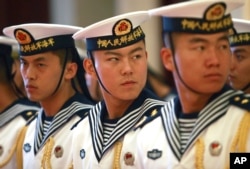Cambodian diplomacy may have succeeded in watering down an ASEAN communique aimed at tackling Chinese maritime ambitions, but some analysts call it was a hollow victory, which has split the 10-nation trading bloc.
Cambodia's refusal to back a multilateral approach aimed at resolving disputes in the South China Sea, they said, have also cost the Association of Southeast Asian Nations (ASEAN) its political bite and that it's now time for a rethink.
“When you actually look at ASEAN as a single unit, it can have the potential to be a regional if not a global power player,” said Taiwanese academic and independent analyst Billy Chia-Lung Tai.
“However, this dispute has created, in my view, a lot of resentment that perhaps hasn't surfaced yet but it will come into play at some point.”
That resentment follows this week's annual ASEAN meeting in Laos, where Cambodia ignored its neighbors and used its support for China to water down a traditional statement in regards to the South China Sea dispute.
The communique failed to mention China's July 12 defeat in The Hague where an international tribunal ruled “there was no legal basis for China to claim historic rights to resources within the sea falling within the nine-dash line."
China refused to recognize the jurisdiction of the court—a move backed by Cambodia—or the legal action initiated by the Philippines.
Money talks
The South China Sea, known as the East Sea in Hanoi and the West Philippine Sea in Manila, is home to thousands of mainly uninhabited tiny islands, atolls, reefs and rocks divided by international waterways.
That includes the Paracel Islands off the east coast of Vietnam, the Philippine-hugging Spratly Islands and Indonesian-held Natuna Island in the south. All three ASEAN members, plus Malaysia and Brunei, have overlapping claims with China.
Southeast Asian parties, particularly Vietnam and the Philippines, want to negotiate multilaterally with China through ASEAN.
But Beijing refuses and, with Phnom Penh's support, insists on bilateral talks, a move strategists say would give China a substantially stronger hand over its much smaller neighbors at the negotiating table.
It's a dispute where Cambodia, a political and economic "minnow," has found rich pickings.
China has disbursed about $15 billion in aid and soft loans to Cambodia over the last two decades, and in recent years has virtually matched foreign aid contributions from the West, dollar-for-dollar.
Beijing also announced a further $600 million aid package almost immediately after The Hague verdict and thanked Hun Sen's government for its support.
A week later, following the meeting in Laos, China indicated it would finance a request from the Cambodians for a 12-story administration building to be constructed for the National Assembly, the country's parliament.
Prime Minister Hun Sen insists Chinese largesse comes with no strings attached, unlike Western money, which is usually tied to Cambodia's human rights record—a constant source of complaints by advocates, the opposition and government critics.
Business as usual
Spokesman for the Council of Ministers Phay Siphan said Cambodia had simply maintained the position it had adopted after a significant shift in his country's foreign policy in 2002, amounting to improved ties with Beijing once China had written-off Cambodia's then debt.
He said his country's posturing would help ensure security over the sea-lanes, where about half the world's shipping trade passes, by maintaining the status quo—a loose doctrine known as the Declaration on the Code of Conduct (DOC).
“Well, I'm happy that ASEAN is together right now, back to what the DOC they are agreeing, as a consensus," he said. "I hope that the COC is going to happen soon because it will give a chance of peace, security as well [as] free navigation of that area – we don't want to see war on there.”
The DOC is the forerunner to establishing the Code of Conduct (COC)—binding laws designed to prevent conflict—over which ASEAN has been sharply rebuked as a "toothless tiger" by commentators of all shades for its inability to push forward on dispute resolution in the 14 years since the DOC was initiated.
Much of that criticism was aimed at Cambodia.
Phnom Penh, however, is increasingly fed-up with the critics, an ever growing chorus complicated by increasing anti-government sentiment at home following recent revelations of the fantastic wealth enjoyed by Hun Sen's family and the killing of independent analyst and activist Kem Ley this month.
Phay Siphan also said Cambodia is a poor country and has every right to accept Chinese generosity, telling a recent debate at the Goethe Institute in Phnom Penh that “no money smells bad.”
Cambodia, with a population of just over 15 million and a GDP of only $18 billion, is still blighted by poverty and remains among the poorest nations in ASEAN, which boasts a total population of 633 million people and a GDP of $2.4 trillion.
What next?
Bernd Schaefer, from the Woodrow Wilson International Center for Scholars, echoed Chia-Lung Tai, saying it went “against the grain” to have Cambodia playing such an important role when it is not a claimant in the dispute and the only country in ASEAN yet to ratify the U.N. Convention on the Law of the Sea (UNCLOS).
“This multilateral forum of 10 countries, having to deal with this issue, leaves them open to all kinds—with certain countries like Cambodia—of outside pressure, and it's actually detrimental, I think, to the future of ASEAN,” he said.
Schaefer said Cambodia had to decide whether to continue pushing the same resolutions or to hold back and let a more pragmatic approach to the dispute take hold.
This, Schaefer added, could include unprecedented bilateral talks between the Philippines and China, given Manila's reinforced and much stronger hand following its victory in The Hague.
He also urged China to take a more pragmatic approach with ASEAN.
“I think China should be more concerned about its international reputation that it pretended to be in recent weeks because these decisions by the court are actually really damaging I think to China's international reputation,” he said.
Chia-Lung Tai stopped short of saying what repercussions Cambodia could face as a consequence of its support for China, but analysts who declined to be named said other ASEAN members would be less inclined to promote Cambodia's agenda within the bloc.
Cambodia has a range of unresolved issues with its neighbors, including border treaties covering oil and gas, the movement of workers, tourism, military, construction of rail lines and dams, and even trans-national crime. All require regional consensus.
Chia-Lung Tai said Cambodia had “clearly decided” China was a more attractive benefactor than its neighbors within the ASEAN bloc, the United States and the West, where aid carries a price in terms of satisfying human rights standards that Cambodia “does not necessarily want to pay.”
“It is interesting to see in the medium- to long-term what price Cambodia will have to pay for their alliance, or perceived alliance, with China," he said. "How that will impact ASEAN as an alliance, which we have seen over the last few years—fracturing, I guess—in light of the South China Sea.”







